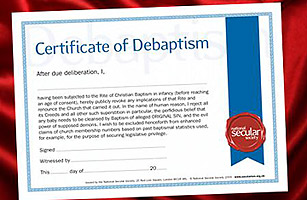 Since the time of Constantine, baptism has often been one of the strands holding together the knot of national identity and Christendom.
Since the time of Constantine, baptism has often been one of the strands holding together the knot of national identity and Christendom.
In other situations, the fear that a child, tainted by Original Sin, might end up in hell for all eternity if she were to die before being baptized has led parents, grandparents and other guardians to seek out baptism in churches as though it might provide some sort of magical fire insurance.
For many in a post-enlightment world, these excesses have served as stumbling blocks to the understanding of baptism as a spiritual practice.
Now the National Secular Society of Great Britian declares on its pages:
Liberate yourself from the Original Mumbo-Jumbo that liberated you from the Original Sin you never had!

For some the notion is amusing. For others — blasphemy. But perhaps we should view it as a serious wakeup call.
Somewhere between our theology, our practice, our everyday beliefs, and our religious instruction there appears to be a serious breakdown in our understanding of exactly what baptism is, what it does, and whom it is for.
If you seriously wanted to "debaptize" yourself, you could always overwrite your Christendom with an Eleke ceremony.